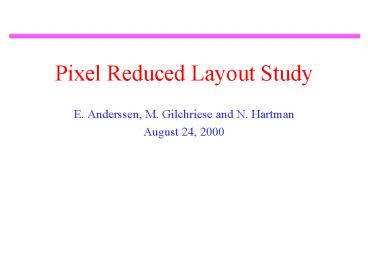Pixel Reduced Layout Study - PowerPoint PPT Presentation
Title:
Pixel Reduced Layout Study
Description:
See figure below. Baseline layout does not have this problem over most of ... Envelope of inner radius of fixed part(see drawing next page) limits disk height. ... – PowerPoint PPT presentation
Number of Views:22
Avg rating:3.0/5.0
Title: Pixel Reduced Layout Study
1
Pixel Reduced Layout Study
- E. Anderssen, M. Gilchriese and N. Hartman
- August 24, 2000
2
Introduction, Dimensions and Rapidity Coverage
- Introduction
- Preliminary thoughts on reduced layout for
discussion - Fixed part is one barrel layer disks and can be
relatively well defined at this time - Insertable part(double B-layer) must fit within
the envelope constraints of the fixed part, the
beam pipe(and its supports) and the forward SCT
and is not so easily fixed now. Options are
presented. - Dimensions
- Dimensions given in tables are nominal physical
dimensions - Coverage attempts to take into account tilt
angles, thickness of sectors, other effects that
are not easily reflected in a few dimensions per
barrel or disk. - Rapidity Coverage
- Plots are binned in 0.05 units of rapidity for
convenience.
3
Current ATLAS Baseline
4
Rapidity Coverage Z0
5
Rapidity Coverage Z11 cm
6
Fixed System - Minimum Disks(11 Sector)
7
Envelope Dimensions
Note that SCT forward envelope dimension is
R110. This the limits radial extent of
insertable system.A pixel thermal barrier
implies a very similar radial limit - see
drawing.
Disk mount
8
Frame Dimensions
Three 11-sector disks requires frame radial
envelope very similar or same as baseline
dimensions. Two 11-sector disks or
10-sector disks would allow radial reduction.
9
Sector Layout
- Two disk layout ignores small region(about 0.5
of area) not covered. See figure below. Baseline
layout does not have this problem over most of
region.
10
Rapidity Coverage Z0
11
Rapidity Coverage Z11 cm
12
Fixed System - Minimum Disks(10 Sector)
13
Rapidity Coverage Z-0
14
Rapidity Coverage Z11 cm
15
Fixed System - Three Disks(11 Sector)
16
Rapidity Coverage Z0
17
Rapidity Coverage Z11cm
18
Fixed System - Three Disks(10 Sector)
- Note that 10-sector disks implies reduction of
about 11 mm in inner radius compared to 11-sector
disks gt this now becomes the limiting radial
aperture for insertable system. - Location of first disk at 492 is tight.
19
Rapidity Coverage Z0
20
Rapidity Coverage Z11 cm
21
Insertable Layers
- In principle, there are a number of options for
the insertable layers - Make 2nd B-layer same length as current
B-layer. - Advantage same design perhaps possible
- Disadvantage. Rapidity coverage limited for 2nd
layer.Material increase at large rapidity(barrel
rather than disks) - Increase the length of the 2nd B-layer eg. 15
modules rather than 13 - Advantage same rapidity coverage
- Disadvantage Material increase. New mechanical
structure? - Shorten somewhat barrel length of B-layers and
add mini-disks(with different modules, however).
Limited by envelope(inner radius) of fixed
system. This appears to limit the barrel to a 10
module system or more. - Advantage full rapidity coverage, somewhat less
material - Disadvantage new mechanical structure for sure.
Different modules.
22
Rapidity Coverage vs Barrel L
Long 2nd B-layer required for full rapidity
coverage
23
Insertable - Current B-layer Length
Guess. Equal length B-layers
24
Rapidity Coverage Z0
25
Rapidity Coverage Z11cm
26
Insertable - Two B-Layer Lengths
15 module layer
27
Rapidity Coverage Z0
13 modules
15 modules
13 modules
28
Rapidity Coverage Z11 cm
29
Insertable - Shorter B-layers/Mini Disks
- Not worked out in any detail.
- Envelope of inner radius of fixed part(see
drawing next page) limits disk height. - Disks must be about 50mm from end of barrels for
services - These two constraints force barrel length to be
at least 10-11 modules(see drawings following
pages). - Requires different modules(eg. 10-chips/module)
for disks. - Full rapidity coverage, in principle, possible
but only can be verified with more work.
30
Short B-layers/Mini Disk Concept
Support cone not modified in this drawing
31
Mini-Disk Layout/Rapidity 2.5 Coverage
- Quick look. Two barrels, 11 modules long. Need
10-chip disk modules.































